Engaging High School Students in Addressing Nuclear Challenges
May 12, 2022
Masako Toki
On April 30, 2022, the James Martin Center for Nonproliferation Studies (CNS) at the Middlebury Institute of International Studies (MIIS) hosted the Critical Issues Forum (CIF) Spring Student Conference with over 100 high school students and teachers from around the world, including Japan, Russia and the United States.
Amidst the increasing risk of nuclear weapons due to Russia’s invasion of Ukraine, the role of youth in promoting peace and disarmament is as important as ever. Recognizing the role of youth engagement, empowerment, and education in tackling global challenges, CIF high school students conducted semester-long projects on the topic “Using Disarmament and Nonproliferation Education to Empower Youth to Address Global and Social Challenges.” The Spring Student Conference is the culmination of CIF project activities.
This is the third year of the global Covid-19 pandemic, and like many other educational projects, CIF has continued to navigate through uncertainties. We appreciate this year’s CIF participants, who overcame many challenges to complete their projects and join the conference.
Opening Session
Dr. William Potter, CNS Founding Director, congratulated participants and highlighted the significance of disarmament and nonproliferation education for high school students, referring to the United Nations Study on Disarmament and Nonproliferation Education adopted at the UN General Assembly 20 years ago. Dr. Potter emphasized the need for CIF students to develop their critical thinking skills, citing one of the UN Study’s goals of teaching “how to think rather than what to think.” Dr. Potter continued to stress our collective responsibility to compel our leaders to avoid a nuclear catastrophe, stating that “the Critical Issues Forum contributes to that objective by helping to empower youth from around the world.” Dr. Potter left students with a call to action: “I hope that you assume leadership positions in your respective governments as soon as possible.”
After Dr. Potter’s remarks, participants viewed a video message from Sarah Pattison, a long-term supporter of CIF and CNS. Pattison congratulated CIF participants on seeking out information and education on these crucial nuclear weapons issues and gaining interpersonal connections with people from other cultures.
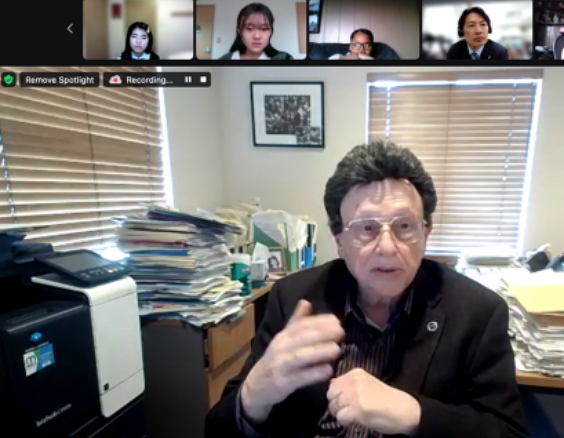
CNS Director Dr. Potter welcomes CIF participants.
UNODA Keynote and Panel Discussions
This year’s CIF project was an excellent platform to enhance collaboration between CNS and the United Nations Office for Disarmament Affairs (UNODA), especially its Youth4Disarmament Initiative. Christopher King, Deputy Chief of the Weapons of Mass Destruction Branch, gave a keynote speech titled “The Importance of Disarmament to International Peace and Security.” King commended the CIF project for its shared goals with the United Nations to empower the leaders of tomorrow to address the most important challenges facing the international community. He called for CIF students to carry out their disarmament efforts with youthful energy, innovation, fresh thinking and different perspectives.
King’s speech was followed by the #Youth4Disarmament initiative panel discussion on the topic “How the United Nations is Empowering, Engaging, and Educating Youth for a Better and Safer Future.” The panel was moderated by Youth Consultant Marykate Monaghan and made up of four other #Youth4Disarmament representatives—two Youth Champions for Disarmament and two winners of the “What If – Spesterra” Youth Video Challenge. Jess Aitkin, a Youth Champion, shared their rewarding experience with the #Youth4Disarmament training program and explained how they learned about various aspects of disarmament. Video challenge winner Yuzuki Osaki highlighted the power of music and art for peace and disarmament, as it can transcend borders, language, cultures, and educational backgrounds.
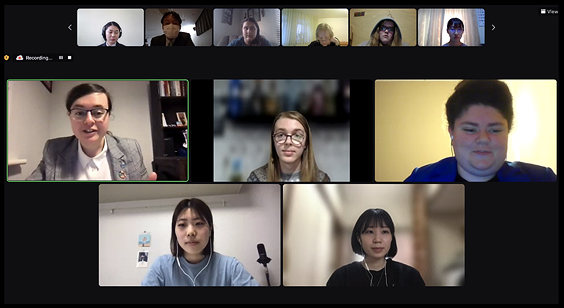
CIF High School students discuss the role of high school students for nuclear disarmament.
CIF Students Panel Discussion
In the second panel discussion, four CIF high school students—Krish Maniar from the Harker School in California, Annie Barnes from Rock University High School in Wisconsin, Shota Maeda from Soka Senior High School in Tokyo, and Yu Harada from Hiroshima Jogakuin Senior High School in Hiroshima—addressed the question “Why should high school students study and engage in nuclear disarmament?”
Maniar argued that there is a misconception that discussions of nuclear weapons are reserved for state officials and policy analysts, and in fact high school students can influence current policymaking by replacing outdated ideas with a set of real, connected, and novel perspectives. Krish emphasized the importance of increasing high school students’ engagement with nuclear issues by introducing his team’s CIF project.
Barnes highlighted the importance of empathy in nuclear education. She stated that learning about the effects of nuclear weapons beyond direct nuclear attacks is important, citing how many communicates are impacted by the mining and sourcing of nuclear materials.
Maeda seconded other panelists’ views on the importance of disarmament education for high school students. Maeda suggested that high school students’ age might make them uniquely relatable and qualified to raise awareness of the evils of nuclear weapons amongst other students.
Harada expressed her concern as a student in Hiroshima that memories of the atomic bombings of Hiroshima and Nagasaki are fading away even among Japanese students. She stressed the importance of high school students as leaders of tomorrow to learn about the threat of nuclear weapons.
Youth Champion Christelle Barakat concluded the panel by commenting on students’ statements. Barakat encouraged participants to start with themselves and others around them and grow awareness gradually. She stated, “It is up to you, and it is up to us, to ensure that weapons are eradicated, because no peace comes from weapons.”
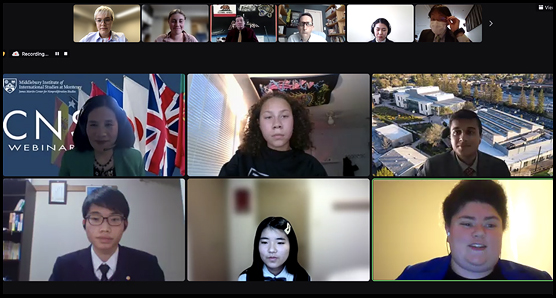
CIF High School students discuss the role of high school students for nuclear disarmament.
Live Presentation
The next segment was a live presentation by a CIF participating school. Participating schools conducted research projects throughout the semester and posted video recordings of their presentations and other deliverables on the online education platform CANVAS prior to the conference for participants to view other schools’ projects. Please see the conference booklet to view all schools’ projects. This year, Choate Rosemary Hall represented the entire 2022 CIF cohort by presenting live on their project, “Reinvesting in our communities: The Reallocation of Funds from Nuclear Arms.”
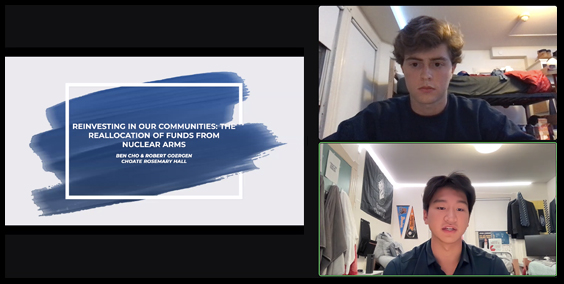
Students from Choate Rosemary Hall present their studies.
Hibakusha Testimonial
A highlight of the conference was the opportunity to listen to a Hibakusha, atomic bombing survivor Masako Wada. Ms. Wada shared a testimonial which included her own heart-wrenching experiences and memories her mother shared with her. Ms. Wada explained that the average age of Hibakusha is now 84, and every year around 9,000 Hibakusha pass away. She urged all young people to work for nuclear disarmament, as they will inherit the Hibakushas’ stories. Ms. Wada asserted that the work must continue, “We Hibakusha have been sincerely and faithfully working towards the abolition of nuclear weapons without taking even a single day of rest.”
In terms of the increasing threat of the use of nuclear weapons due to the Russian invasion of Ukraine, Ms. Wada stated that “The threat of the use of nuclear weapons is more imminent than before.” Ms. Wada shared that she felt powerless and worried that Hibakusha’s cries might not have been strong enough. Still, she shared her renewed determination to “convey the horror of nuclear weapons, as more people should learn what really happens if nuclear weapons are used against humanity.” Ms. Wada concluded her testimonial with powerful resolve: “Our wish is that no one will ever suffer from the use of nuclear weapons as we have… Hibakusha will take whatever time remains for each of us to continue to talk with all of you, young people.”
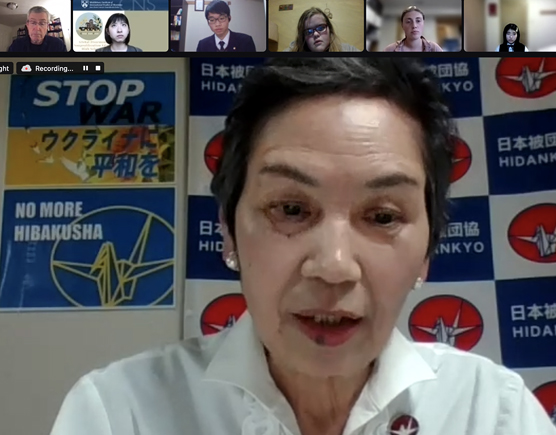
Hibakusha, Ms Masako Wada shares her testimonial.
Breakout Sessions
CIF students also had a chance to develop and foster intercultural competence and friendships through two breakout sessions. The first session was an intercultural trivia game designed to help students develop cross-cultural understanding of their peers from different countries. Students in groups of 5 to 7 answered culture-related questions. The second breakout session was designed for students to discuss their projects and reflect on the conference. All CIF students had a chance to share and exchange their views on nuclear disarmament, the role of youth, their CIF experience, and their future goals and dreams.
Conclusion
Each student and participating school received an Award of Excellence and a Certificate of Completion recognizing their excellent work and dedication to the CIF project. In addition, this year’s CIF students were each designated as a Youth Communicator for a World without Nuclear Weapons by the Japanese Ministry of Foreign Affairs. This has been the case every year since 2016. As the only country that has experienced wartime nuclear devastation, Japan has been promoting disarmament and nonproliferation education, which shares the goals of CNS and the CIF project.
As the world is moving in the opposite direction of nuclear disarmament, it is easy for us to succumb to a sense of resignation. Forging ahead toward the goal of a nuclear weapons-free world is a competition between resignation and hope. We must continue to uplift the power of young people and educators to make the world a safer place. CNS continues to strive to educate and empower young people to engage in solving the world’s most serious problems.
This year’s Critical Issues Forum project is made possible by funding from the Tom and Sarah Pattison Fund, the SAGA Foundation, the Kathryn Wasserman Davis Collaborative in Conflict Transformation Fund, Mr. Gregg Wolpert, and many generous private donors
Participating Schools
United States
- Choate Rosemary Hall, Wallingford, CT
- The Harker School, San Jose, CA
- Monterey High School, Monterey, CA
- Rock University High School, Janesville, WI
Japan
- Hiroshima Jogakuin Senior High School, Hiroshima
- Kansai Soka Senior High School, Osaka
- Nagasaki Higashi High School, Nagasaki
- Soka Senior High School, Tokyo
Russia
- School № 41, Novouralsk
- School № 164, Zelenogorsk